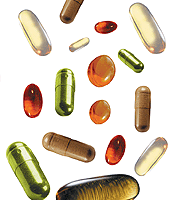Advertisement
Super Supplements for Women
Long ago I saw a remarkable picture of women of all ages standing shoulder to shoulder in a big circle. Their open hands stretched high above their heads as if they were balancing something on them. The words on the poster said: “Women hold up half the sky.” Women also hold down nearly half the … Continued

Long ago I saw a remarkable picture of women of all ages standing shoulder to shoulder in a big circle. Their open hands stretched high above their heads as if they were balancing
something on them. The words on the poster said: “Women hold up half the sky.”
Women also hold down nearly half the jobs. They do more than half the housework, prepare most of the meals, carry all the babies, climb the corporate ladder, go to school, care for their growing families, and help their aging parents. Frequently, the only person a woman fails to take care of is herself.
Whatever stage of life a woman is in, her overall health and well-being is greatly affected by her daily nutrient intake from whole natural foods and nutritional supplements. In
combination with a positive attitude and physical activity, nutritional status has a significant impact on energy levels, moods, mental ability, immunity, and aging.
Here’s a quick look at some of the best nutritional and herbal supplements for women. Hopefully, it will inspire you to be mindful of your own well-being.
Chaste Tree Berry (Vitex agnus-castus)
The medicinal berries of this beautiful flowering bush are one of the best remedies for PMS. For the vast majority of women, getting within 10 days of their “time of the month” means they get noticeably cranky, weepy, moody, bloated, achy and crampy. Chaste tree berry can save a woman and her friends and family from the emotional and physical torments of PMS.
Recently, the Journal of Ethnopharmacology (January, 2006) published the results of a study conducted by researchers from the University of Illinois. The study determined that chaste tree berry extract acted as an “agonist at the mu-opiate receptor.” In plain English, this means that chaste tree berry attaches to opiate receptor sites in the central nervous system, reducing pain and promoting a state of relaxation. Unlike opiate drugs, however, chaste tree berry is not habit forming.
Many other respected journals, including the Journal of Women’s Health and Gender-based Medicine and the British Medical Journal, have published articles that show chaste tree berry is an effective and well-tolerated treatment for the relief of PMS symptoms including depression, anxiety, cravings, and water retention.
Evening Primrose Oil, Black Currant Oil, and Borage Oil
The oils extracted from evening primrose, black currant, and borage seeds have all been recognized as beneficial to women with PMS and menopausal hot flashes. Functioning as prostaglandin regulators, these essential fatty acid precursors help balance hormonal levels. Another important benefit of supplementing the diet with these oils, especially as we age, is their moisturizing effect on skin.
The Three Amigas
Folic acid, B6, and B12 are every woman’s friend. These three B vitamins protect against heart disease by neutralizing high homocysteine levels, which damage arterial walls. In addition, women of child-bearing age need folic acid to prevent birth defects. Other research shows folic acid has cancer-preventive properties. Vitamins B6 and B12 are potent stress fighters and energizers, while B6 is especially beneficial for women with PMS. Taking a complete, high potency vitamin B complex will provide extra stress-busting benefits.
Dose up on Chromium
Women can reduce their risk of diabetes by maintaining a healthy weight, limiting their sugar and refined carbohydrate intake, and supplementing with chromium. Chromium helps to put the brakes on binge eating, especially sweets. Studies involving women of all ages have shown significant improvements in glucose tolerance by taking chromium. The recommended dosage range is from 200 to 1,000 mcg daily.
Calcium and Vitamin D
Researchers affiliated with the Nurses’ Health Study found that higher dosages of calcium and vitamin D supplementation may not only reduce the severity of PMS symptoms, but may also prevent it in the first place.
Published in the Archives of Internal Medicine (2005), the study reported that women with the highest intake of calcium and vitamin D had the lowest occurrence of PMS. The researchers also noted that calcium and vitamin D may reduce the risk of osteoporosis and some cancers.
Another study conducted at Dalhousie University and published in the November 2002 issue of Family Physician concluded that one of the most effective treatments for PMS is a daily intake of 1200 mg of calcium.
If you are a pregnant or lactating woman, seek the advice of your qualified health professional to help determine your ideal nutritional and herbal supplement program.
Of Special Interest to Women
Dr. Mary L. Hardy, medical director of the Cedars-Sinai Medical Center program in Integrative Medicine, reviewed the published literature of rigorously controlled studies that were conducted to determine the active constituents, mechanism of action, and clinical value of specific herbal remedies traditionally used by women. Her study was published in the Journal of the American Pharmaceutical Association (2000).
Here’s Dr. Hardy’s selected list of phytomedicines deemed to be safe and effective for a variety of women’s health issues.
Evening primrose oil: PMS, menopause, skin
Black cohosh root extract: hot flashes
Dong quai: general tonic for women, best used in combination with other Chinese herbs
Chaste tree berry: PMS




